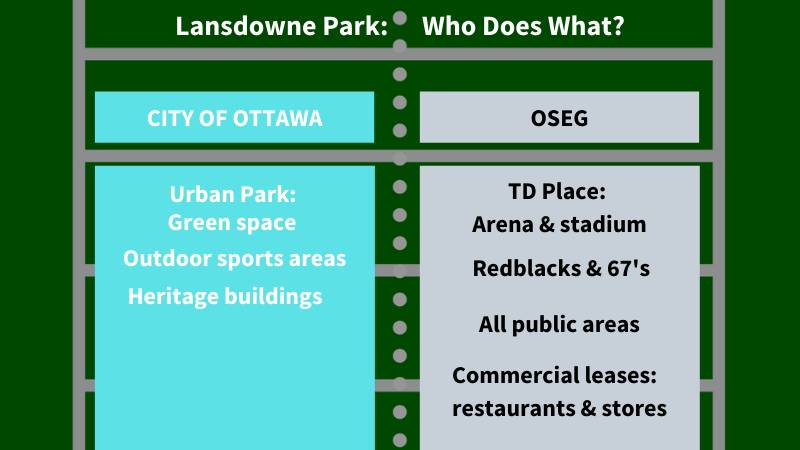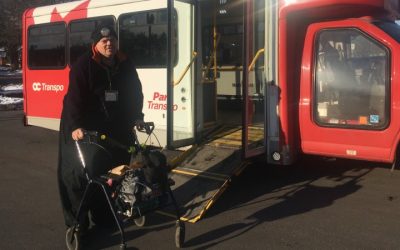Lansdowne proposal triggers backlash
by Kevin O'Rourke McColl | Nov 15, 2019Photo by Kevin O’Rourke McColl.
Several years after its controversial redevelopment, Lansdowne Park is back in the news. A proposal that would see the Ottawa Sports and Entertainment Group take over control of the city-run parts of the park is sparking controversy among the city’s residents.
Residents are worried that letting a private company control operations would affect the availability and pricing of space at the park. They are also angry that there have not been any public consultations.
Community Reaction
Community groups reacted by taking to social media and encouraging community members to voice their opinion about the proposal.
Thank you to the hundreds who came out to hear about changes at Lansdowne. Public parks with programming in the public interest under public management was a big message. @OSEGMarkGoudie @JimWatsonOttawa @ShawnMenard1 @Laura_Dudas @TimTierney
— Glebe CA (@GlebeCA) October 29, 2019
A public meeting was held on Oct. 28 at the Aberdeen Pavilion, which included city councillors and representatives OSEG. The meeting was held in response to citizens’ concerns over the private takeover.
Coun. Shawn Menard has been vocal about his opposition to the proposal. Menard also started a petition on his website, which currently has 2,500 signatures and continues to grow.
A spokesperson at Menard’s office also expressed surprise at how quickly OSEG’s request was moving forward.
“It was a bit of a surprise without consulting the public or the office.”
Menard also expressed concern at city committee meeting on Nov. 5.
“This is a significant issue that will have impacts on the public areas of the park and the surrounding communities,” Menard said at the meeting. “If transferring control to OSEG is the preferred course of action, that should only be determined when we have all the necessary information, and we have done thorough public consultations with all impacted parties.”
At the Nov. 5 meeting, the committee voted to slow things down, deciding to first “undertake exploratory discussions” before potentially moving forward with the proposal, meaning they will perform a variety of public consultations.
The city-run parts of Lansdowne, including the Aberdeen Pavilion and Horticulture Building, are often used by community organizations, such as the Ottawa Farmers’ Market and the 613flea market.
In the interest of preserving potential business relationships, Catherine Knoll, an organizer with 613flea market, did not want to comment too specifically on the potential handover.
“We don’t want to say too much about this because these could be the people we ultimately end up working with.”
What are the proposed changes?
On Sept. 24, OSEG gave the city a “recommendation and request” allowing OSEG to assume control over the management of all programming at Lansdowne.
This would mean anyone wanting to rent space in the Aberdeen Pavilion would have to deal with OSEG, not the city. This could affect the availability or price of rentals.
On Oct. 25, the city manager Steve Kanellakos submitted the annual Lansdowne Partnership Plan Report to the city’s finance and economic development committee.
The report recommended that the city direct the recreation, cultural and facility manager to negotiate the transfer of city-controlled operations from the Lansdowne site to OSEG.
In 2018, the city spent almost $1.3 million on the operations of the urban park. The report said negotiating the transfer of operations would “seek to reduce or eliminate the city’s current operating expenses.”
So far, OSEG has contributed $144 million to the Lansdowne Park project, $88 million more than expected.
“OSEG is not expected to recoup a total of $69 million,of interest/funding, and the city would not receive $62 million of accrued interest,” the report said.
However, these calculations include what OSEG might make by taking over all operations. If the city continues operations at Lansdowne, OSEG would not make back $76 million of its interest/funding.
Under these calculations, OSEG taking over could save them $7 million over the course of the partnership.
Public-private partnerships: who benefits?
The city and OSEG manage different parts of the park.

Graphic Illustration by Kevin O’Rourke McColl
The agreement between the City of Ottawa and OSEG is called the Lansdowne Partnership Plan.
It is a public-private partnership, which is a business model for public organizations to partner with private companies. It is often used for large building projects.
Public-private partnerships are appealing to cities because it allows them to start a large project without paying for it all at once. The city pledges a total amount of money to be paid over a number of years, while the private company is responsible for building and maintenance, and receives most of the revenue.
The city usually makes interest on their initial investment.
For a private company, a public-private partnership is appealing because it is a long-term contract and it is secure: as long as they fulfil the contract, they will get paid.
The City of Ottawa is involved in several public-private partnerships, including Lansdowne Park and the Ottawa Light Rail Project.
However, not all councillors support public-private partnerships.
“They have not lived up to their promises,” said a spokesperson from Menard’s office.
“We want discussion with the community to make [Lansdowne] more vibrant and make it a place for people. The original plan said it was going to be an ‘urban village,’ which is not a bad vision. Let’s get back to it.”
Greenspace Gripes
Kanata residents aren’t sure the grass is greener when it comes to plans for local golf course
Waiting, Wishing, Wondering
Transit woes may be new to LRT riders, but Para Transpo users have lived with unreliable transit for years.
To Heck With Sugar and Spice
Carleton Ravens female basketball players are inspiring female athletes to combat sports stereotypes.





